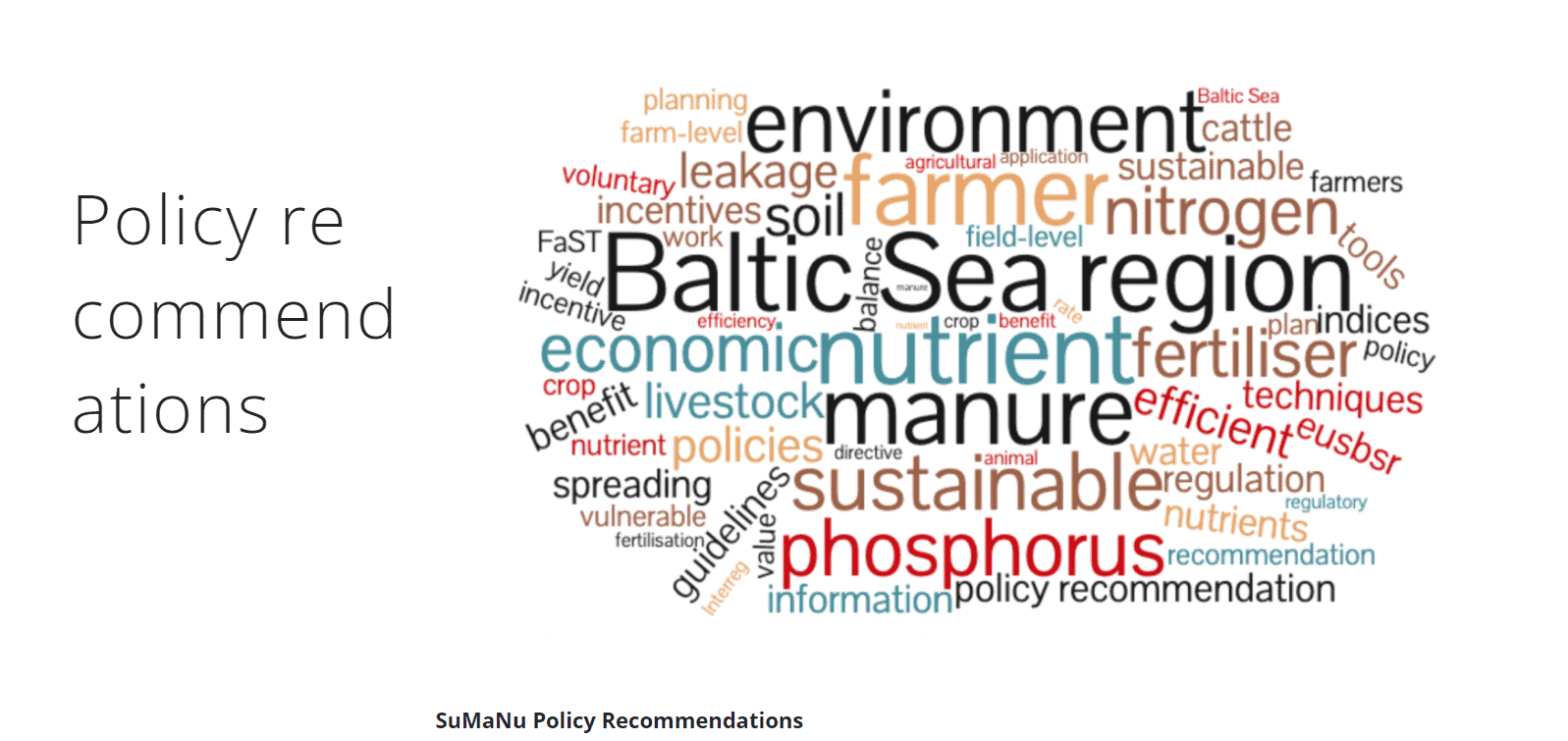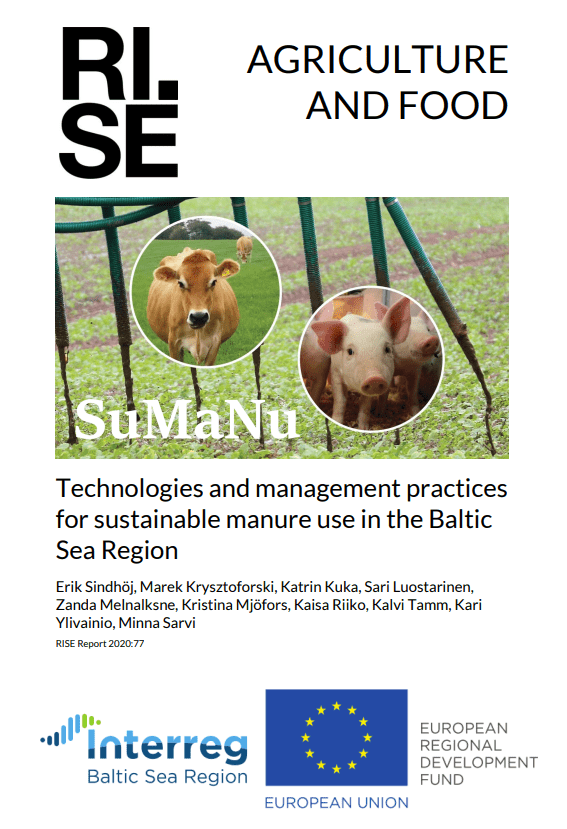SUMANU
Keeping nutrients in food production
Efficient manure and nutrient management in agriculture is beneficial for the environment and for farmers. This is the only way to secure sustainable food production in the future. Nutrient loss from fields to waterways leads to eutrophication. Livestock production is the main source of ammonia emissions, causing acidification, eutrophication and the formation of unhealthy particles. The loss of valuable nutrients is also an economic loss for farmers. SuMaNu analysed and synthesised the results and recommendations of selected cooperation projects which aimed towards agro-environmental sustainability and seeks to link them better to policies.
Four approaches - from manure to soil and air
The Interreg project platform SuMaNu analysed and synthesised existing results and recommendations of selected cooperation projects that aimed towards agro-environmental sustainability and its links to policies.
SuMaNu combined Interreg Baltic Sea Region projects Baltic Slurry Acidification and Manure Standards, Interreg Central Baltic project GreenAgri and BONUS Programme project BONUS PROMISE. Baltic Slurry Acidification helped reduce ammonia emissions from livestock production by promoting slurry acidification technologies. Manure Standards developed joint guidelines for more efficient collection and usage of manure data. GreenAgri worked on reducing nutrient losses in the Baltic States by introducing and testing environmentally-friendly management of organic fertilisers. BONUS PROMISE evaluated methods to close the agricultural phosphorus cycle with a special view on contamination risks when recycling organic waste materials. Also, the platform considered findings of previous projects, such as Baltic Manure, Baltic Compass and Baltic Compact.
Projects represented in the platform:
- Interreg Baltic Sea Region: Baltic Manure | Baltic Slurry Acidification
- Interreg Central Baltic: GREENAGRI
- BONUS: PROMISE
Budgets
in numbers
-
1.00MillionTotal
-
0.77MillionErdf
-
0.00MillionEni + Russia
-
0.00MillionNorway
Achievements
Synthesis of knowledge
The SuMaNu project platform has compiled the thirteen-year experience of transnational cooperation in agriculture and sustainable manure and nutrient management in the Baltic Sea region.
The partners synthesised the results of Interreg Baltic Sea Region, Interreg Central Baltic and BONUS projects into a report on best practices along the entire manure handling chains as well as policy recommendations. These best practices and policy recommendations focused on phosphorus regulation, nutrient-balanced fertilisation and nutrient accounting, on-farm manure handling and utilisation, mitigation of regional nutrient surpluses, hygienic and safety issues, and knowledge transfer and advisory service. More than 200 national and regional authorities, farmers and their advisories supported the objectives and the focus of these recommendations. In Latvia, for example, more advanced manure spreading technologies were promoted to farmers to replace still widely used broadcast spreading. In Finland, the authorities discussed whether to include phosphorous fertilisation limits into legislation instead of voluntary measures.
Building Nutrient Recycling Strategy with HELCOM
The most tangible outcome of the SuMaNu platform was its contribution to the development of the new Baltic Sea Regional Nutrient Recycling Strategy by the Baltic Marine Environment Protection Commission, known as HELCOM. The vision of this new HELCOM Strategy is that “nutrients are managed sustainably in all HELCOM countries, securing the productivity of agriculture and minimising nutrient loss to the Baltic Sea environment through efficient use of nutrients and cost-effective nutrient recycling.” It was adopted at the HELCOM Ministerial Meeting in October 2021. The Strategy contains a longer list of possible measures, which the HELCOM countries can implement. This is where the SuMaNu platform together with the EUSBSR coordinators of the policy areas Nutri and Bioeconomy brought in their invaluable experience and synthesis from transnational cooperation. The SuMaNu proposals that could help implement the Strategy and make the Baltic Sea region a model area for nutrient recycling included such measures as: “Define clear joint goals for plant nutrient balances”, and “Create regional nutrient balance and nutrient recycling strategies for each country” and “Introduce incentives for use and production of recycled nutrients”.
In addition, the SuMaNu recommendations related to fertiliser planning, nutrient balances and improving knowledge exchange were included in the HELCOM Baltic Sea Action Plan (BSAP) updated in 2021. This way the SuMaNu synthesis continues working till 2030 to guide the regional work on nutrient recycling and to reduce nutrient losses from agriculture.
Outputs
Policy recommendations

Technologies and management practices for sustainable manure use in the Baltic Sea region

Project Stories
-
18.05.2021
SuMaNu featured on interreg.eu portal
From Adriatic to Baltic Sea: read how to achieve clear waters through cooperation and use #MadeWithInterreg smart ideas to save the seas from pollution.Read full story -
09.09.2020
Interview: “Interreg projects can push into the right direction”
To improve the water quality of the sea has been a continuous objective of Interreg Baltic Sea Region and its predecessor programmes. Many projects have received funding to reduce negative impacts of agriculture on the sea. The platform SuMaNu gathers and synthesises best practices and recommendations on nutrient management. We interviewed Henning Lyngsoe Foged from Aarhus, Denmark, who has been one of the driving forces to spread agri-environmental innovations across countries around the Baltic Sea.Read full story -
07.02.2020
Interview: How the SuMaNu platform creates synergies between projects
SuMaNu is about sustainable manure and nutrient management and is directly connected with the ongoing development of a Nutrient Recycling Strategy for the Baltic Sea. Interreg Baltic Sea Region’s project platforms are designed to capitalise on the results of existing projects financed from different EU funding Programmes and to create synergies between them, e.g. by feeding into policy making. We interviewed three experts from the SuMaNu platform, which started in autumn 2018, to find out.Read full story -
03.06.2019
A chemical trick to make the Baltic Sea waters clearer
There is something that house cleaning products, brie cheese and a pile of animal manure have in common. That is an pungent and unpleasant smell. A reason behind the bad odour is the chemical compound ammonia. The smell ammonia spreads is as bad as it’s harmful for the environment. Therefore, partners within the Baltic Slurry Acidification project joined forces to reduce the ammonia emitted from farms.Read full story
Partners
Natural Resources Institute Finland (Luke)
- TownHelsinki
- RegionHelsinki-Uusimaa
- CountryFinland
- RepresentativeMinna Sarvi
- Phone
- E-Mail
- Web
Baltic Marine Environment Protection Commission - Helsinki Commission (HELCOM)
- TownHelsinki
- RegionHelsinki-Uusimaa
- CountryFinland
- RepresentativeSusanna Kaasinen
- Phone
- E-Mail
- Web
The Foundation for a Living Baltic Sea (BSAG)
- TownHelsinki
- RegionHelsinki-Uusimaa
- CountryFinland
- RepresentativePaula Biveson
- Phone
- E-Mail
- Web
Estonian Crop Research Institute (ECRI)
- TownJõgeva
- RegionLõuna-Eesti
- CountryEstonia
- RepresentativeKalvi Tamm
- Phone
- E-Mail
- Web
Union Farmers Parliament (ZSA)
- TownRiga
- RegionRīga
- CountryLatvia
- RepresentativeZanda Melnalksne
- Phone
- E-Mail
- Web
Agricultural Advisory Center in Brwinow (CDR)
- TownBrwinow
- RegionWarszawski wschodni
- CountryPoland
- RepresentativeMateusz Sekowski
- Phone
- E-Mail
- Web
Organe Institute Aps
- TownSkødstrup
- RegionØstjylland
- CountryDenmark
- RepresentativeHenning Lyngsø FOGED
- Phone
- E-Mail
- Web
Julius-Kühn-Institut (JKI), Federal Research Centre for Cultivated Plants
- TownBraunschweig
- RegionBraunschweig, Kreisfreie Stadt
- CountryGermany
- RepresentativeKatrin Kuka
- Phone
- E-Mail
- Web
Research Institute of Sweden (RISE)
- TownUppsala
- RegionUppsala län
- CountrySweden
- RepresentativeErik Sindhöj
- Phone
- E-Mail
- Web
-
Project managerMinna SarviNatural Resources Institute Finland (Luke)
-
Legal representativeEeva-Liisa RyhänenNatural Resources Institute Finland (Luke)
-
Financial managerRaili KeronenLuonnonvarakeskus Natural Resources Institute Finland
-
Communication managerPaula BivesonThe Foundation for a Living Baltic Sea (BSAG)



